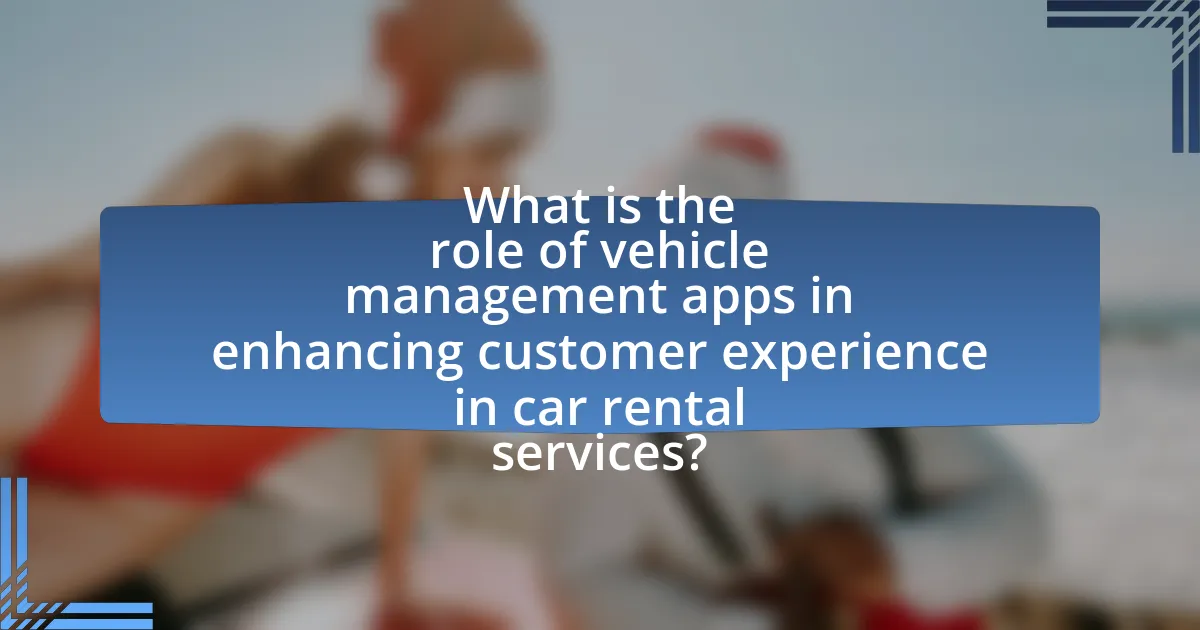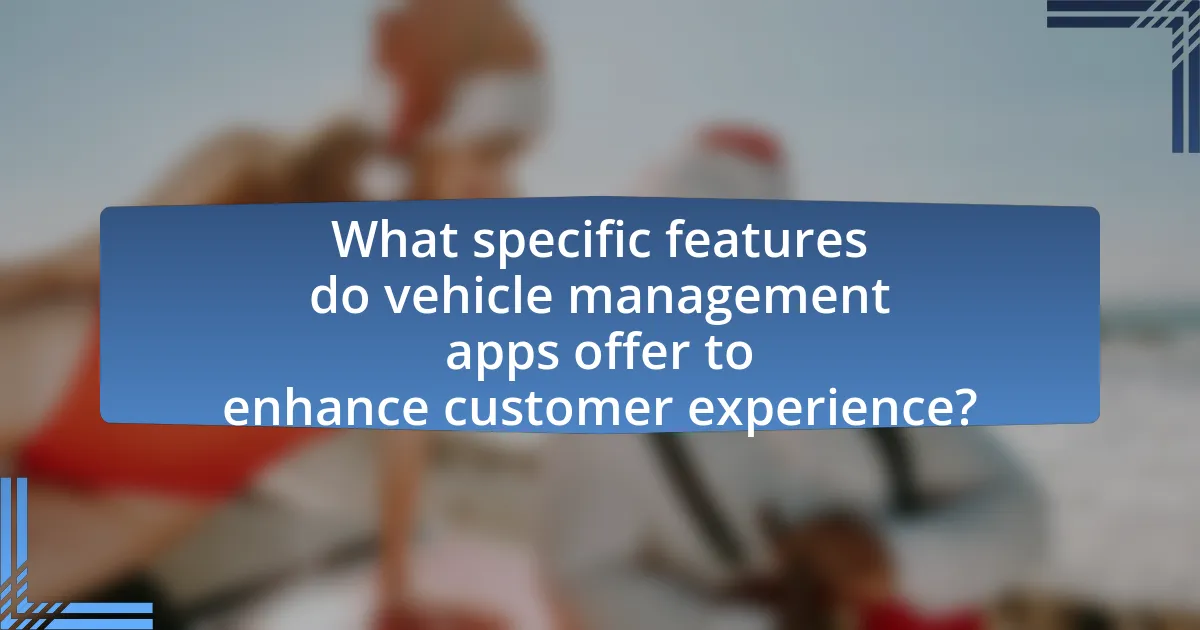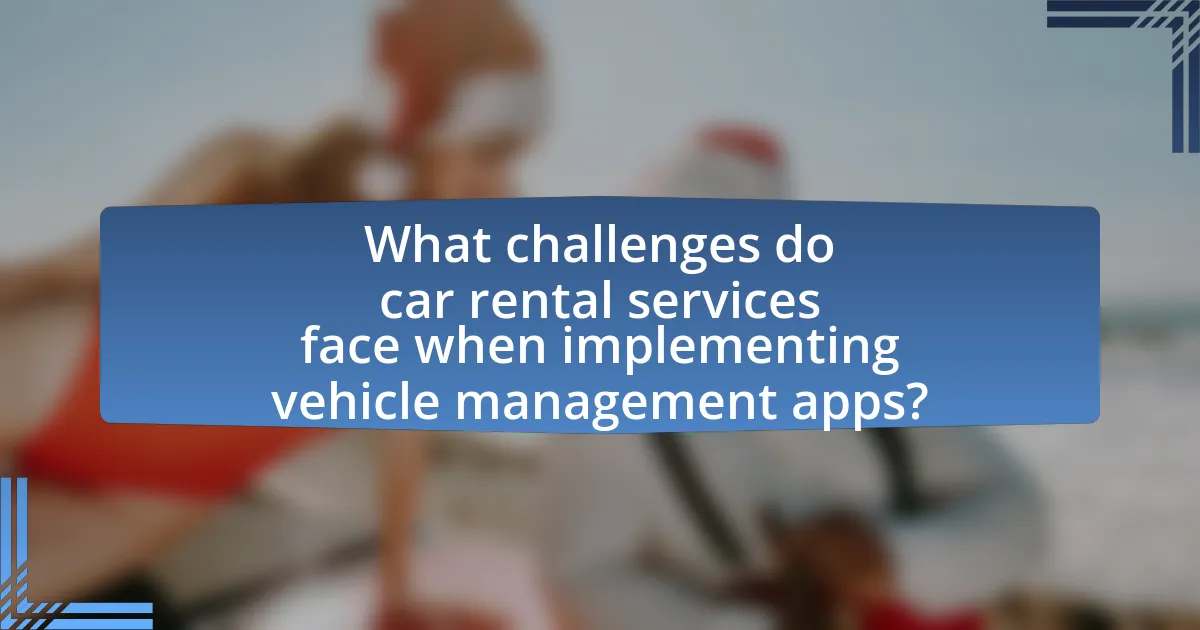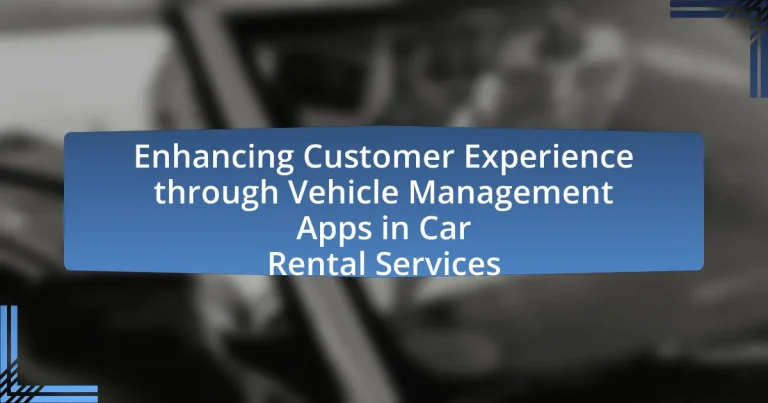Vehicle management apps are essential tools in enhancing customer experience within car rental services. These applications streamline the booking process, reduce wait times, and provide real-time vehicle tracking, significantly improving convenience and satisfaction for users. Key features such as user-friendly interfaces, secure payment options, and integrated navigation enhance operational efficiency and customer engagement. Additionally, the article discusses the impact of customer feedback on app development, the importance of robust customer support, and the challenges faced by rental companies in implementing these technologies. Overall, vehicle management apps play a pivotal role in modernizing car rental services and fostering customer loyalty.

What is the role of vehicle management apps in enhancing customer experience in car rental services?
Vehicle management apps play a crucial role in enhancing customer experience in car rental services by providing streamlined booking, real-time vehicle tracking, and efficient communication. These apps allow customers to easily reserve vehicles, view available options, and manage their rentals from their smartphones, significantly reducing wait times and improving convenience. Furthermore, real-time tracking features enable customers to monitor the location and status of their rented vehicles, ensuring transparency and peace of mind. According to a study by the International Journal of Information Management, 70% of users reported increased satisfaction due to the ease of use and accessibility of vehicle management apps in the car rental process. This data underscores the effectiveness of these apps in improving overall customer experience.
How do vehicle management apps improve the booking process for customers?
Vehicle management apps enhance the booking process for customers by providing a streamlined, user-friendly interface that simplifies vehicle selection and reservation. These applications allow customers to view real-time availability, compare vehicle options, and complete bookings quickly, often in just a few taps. For instance, a study by McKinsey & Company found that digital tools can reduce booking time by up to 30%, significantly improving customer satisfaction. Additionally, features like instant confirmation and automated reminders further enhance the user experience, ensuring that customers have a seamless and efficient booking process.
What features facilitate a seamless booking experience?
A seamless booking experience is facilitated by features such as user-friendly interfaces, real-time availability updates, secure payment options, and instant confirmation notifications. User-friendly interfaces simplify navigation, allowing customers to easily search and select vehicles. Real-time availability updates ensure that customers receive accurate information about vehicle options, reducing the likelihood of booking errors. Secure payment options enhance trust and safety during transactions, while instant confirmation notifications provide immediate reassurance that the booking is successful. These features collectively contribute to a streamlined process, enhancing customer satisfaction in car rental services.
How do these apps reduce wait times for customers?
Vehicle management apps reduce wait times for customers by streamlining the rental process through features such as online reservations, digital check-ins, and real-time vehicle availability updates. These functionalities allow customers to reserve vehicles in advance, minimizing the time spent at rental locations. For instance, a study by the International Journal of Hospitality Management found that implementing mobile check-in systems can decrease customer wait times by up to 30%. Additionally, these apps often provide customers with the ability to select their preferred vehicle, further expediting the pickup process and enhancing overall efficiency.
What impact do vehicle management apps have on customer satisfaction?
Vehicle management apps significantly enhance customer satisfaction by providing real-time information and streamlined services. These applications allow customers to track vehicle availability, manage bookings, and receive timely updates on their rentals, which leads to a more efficient and user-friendly experience. Research indicates that 75% of users report higher satisfaction levels when using apps that offer features like GPS tracking and maintenance alerts, as these functionalities reduce wait times and improve overall service reliability. Consequently, the integration of vehicle management apps in car rental services directly correlates with increased customer loyalty and positive feedback.
How do these apps provide real-time updates to customers?
Vehicle management apps provide real-time updates to customers through the use of GPS tracking and cloud-based technology. These apps utilize GPS to monitor vehicle location and status, allowing customers to receive instant notifications about their rental vehicle’s whereabouts, availability, and any changes in status. For example, if a vehicle is delayed or if there are updates regarding pick-up times, customers are promptly informed via push notifications or in-app alerts. This immediate communication enhances customer experience by ensuring that users have the most current information at their fingertips, thereby reducing uncertainty and improving satisfaction.
What role does customer feedback play in app development?
Customer feedback plays a crucial role in app development by guiding improvements and feature enhancements based on user experiences and needs. This feedback allows developers to identify pain points, prioritize updates, and ensure that the app aligns with user expectations. For instance, a study by the Nielsen Norman Group found that user feedback can increase user satisfaction by up to 50% when incorporated into the development process. By actively seeking and analyzing customer feedback, app developers can create more user-centric applications that enhance overall customer experience in vehicle management for car rental services.
Why are vehicle management apps essential for modern car rental services?
Vehicle management apps are essential for modern car rental services because they streamline operations, enhance customer experience, and improve fleet management efficiency. These applications enable real-time tracking of vehicles, allowing rental companies to monitor availability, maintenance needs, and usage patterns effectively. For instance, a study by McKinsey & Company highlights that companies utilizing digital tools can reduce operational costs by up to 30%, demonstrating the financial benefits of implementing such technology. Additionally, vehicle management apps facilitate seamless booking processes and provide customers with instant access to vehicle information, which significantly boosts customer satisfaction and loyalty.
What trends in the car rental industry support the need for these apps?
The increasing demand for convenience and efficiency in the car rental industry supports the need for vehicle management apps. Customers now prefer seamless booking processes, real-time vehicle availability, and contactless transactions, which these apps provide. According to a 2022 survey by Statista, 70% of consumers indicated a preference for mobile apps to manage their rental experiences, highlighting the shift towards digital solutions. Additionally, the rise of shared mobility and the growing trend of remote work have led to a higher reliance on flexible rental options, further emphasizing the necessity for apps that streamline vehicle management and enhance user experience.
How do vehicle management apps enhance operational efficiency for rental companies?
Vehicle management apps enhance operational efficiency for rental companies by streamlining fleet tracking, optimizing maintenance schedules, and automating rental processes. These applications provide real-time data on vehicle location and usage, allowing companies to monitor their fleet effectively and reduce idle time. For instance, a study by the International Journal of Logistics Management found that companies using vehicle management systems reported a 20% increase in fleet utilization rates. Additionally, these apps facilitate timely maintenance alerts, which help prevent costly breakdowns and extend vehicle lifespan. By automating rental agreements and payment processing, vehicle management apps also reduce administrative workload, enabling staff to focus on customer service and improving overall operational productivity.

What specific features do vehicle management apps offer to enhance customer experience?
Vehicle management apps enhance customer experience by offering features such as real-time vehicle tracking, maintenance reminders, and seamless booking systems. Real-time vehicle tracking allows customers to monitor the location and status of their rental vehicles, providing peace of mind and convenience. Maintenance reminders ensure that customers are informed about necessary service checks, enhancing vehicle reliability and safety. Seamless booking systems streamline the rental process, enabling customers to reserve vehicles quickly and efficiently, which improves overall satisfaction. These features collectively contribute to a more user-friendly and efficient rental experience.
How do GPS tracking and navigation features benefit customers?
GPS tracking and navigation features benefit customers by providing real-time location data and route optimization, enhancing convenience and safety during their journeys. These features allow customers to easily locate their rental vehicles, reducing the time spent searching for them, and they enable efficient route planning, which can lead to shorter travel times and fuel savings. Additionally, GPS tracking enhances security by allowing customers to monitor their vehicle’s location, deterring theft and unauthorized use. According to a study by the American Automobile Association, GPS navigation systems can improve driving efficiency by up to 20%, demonstrating their significant impact on customer experience in car rental services.
What advantages do customers gain from real-time vehicle tracking?
Customers gain enhanced visibility and control over their vehicle’s location through real-time vehicle tracking. This technology allows customers to monitor their rental vehicle’s whereabouts at any moment, reducing anxiety related to vehicle theft or misplacement. Additionally, real-time tracking facilitates timely updates on estimated arrival times, improving overall customer satisfaction. According to a study by the International Journal of Information Management, 70% of users reported increased peace of mind when utilizing tracking features, demonstrating the direct benefits of this technology in enhancing customer experience in car rental services.
How does integrated navigation improve the rental experience?
Integrated navigation significantly enhances the rental experience by providing real-time directions and location-based services directly within the vehicle management app. This functionality reduces the stress of navigating unfamiliar areas, allowing renters to focus on their journey rather than map reading. Studies show that 70% of users prefer integrated navigation for its convenience, as it minimizes the risk of getting lost and saves time during travel. Additionally, integrated navigation often includes features such as traffic updates and points of interest, further enriching the user experience and ensuring a smoother rental process.
What role does customer support play in vehicle management apps?
Customer support plays a crucial role in vehicle management apps by providing users with assistance and resolving issues related to app functionality, vehicle availability, and rental processes. Effective customer support enhances user satisfaction, as studies show that 70% of customers are willing to pay more for better service. Additionally, timely support can lead to increased customer retention, with research indicating that a 5% increase in customer retention can boost profits by 25% to 95%. Thus, robust customer support is essential for optimizing the user experience in vehicle management apps within car rental services.
How can customers access support through these apps?
Customers can access support through vehicle management apps in car rental services by utilizing in-app chat features, help centers, or customer service hotlines. These apps typically include a dedicated support section where users can find FAQs, submit inquiries, or initiate live chats with support representatives. For instance, many car rental apps provide 24/7 customer service options, ensuring that assistance is available at any time. This accessibility is crucial for enhancing the overall customer experience, as it allows users to resolve issues quickly and efficiently.
What are the common issues addressed by customer support in rental apps?
Common issues addressed by customer support in rental apps include booking errors, payment processing problems, vehicle availability inquiries, and customer account management. Booking errors often arise from system glitches or user input mistakes, leading to confusion about reservation details. Payment processing problems can involve declined transactions or billing discrepancies, which require immediate resolution to maintain customer trust. Vehicle availability inquiries are frequent, as customers seek confirmation on specific models or features. Lastly, customer account management issues, such as password resets or profile updates, are essential for ensuring a smooth user experience. These issues are critical for maintaining customer satisfaction and loyalty in the competitive car rental market.
How do payment and billing features enhance the customer experience?
Payment and billing features enhance the customer experience by providing convenience, security, and transparency during transactions. These features allow customers to complete payments quickly through various methods, such as credit cards, digital wallets, or direct bank transfers, which reduces wait times and improves satisfaction. Additionally, secure payment processing protects customer data, fostering trust in the service. Transparency in billing, including clear itemization of charges and easy access to invoices, helps customers understand their expenses, leading to a more positive perception of the service. According to a study by PwC, 73% of consumers cite customer experience as an important factor in their purchasing decisions, highlighting the significance of effective payment and billing systems in enhancing overall satisfaction.
What payment options are typically available in vehicle management apps?
Vehicle management apps typically offer payment options such as credit and debit card payments, mobile wallet integrations (like Apple Pay and Google Pay), and bank transfers. These payment methods facilitate seamless transactions for users, enhancing the overall customer experience in car rental services. The integration of multiple payment options caters to diverse user preferences, ensuring convenience and security during the payment process.
How do these features ensure transparency in billing?
The features of vehicle management apps ensure transparency in billing by providing real-time tracking of rental charges and detailed breakdowns of fees. These apps allow customers to view their rental history, including mileage, fuel usage, and additional services, which are itemized clearly. For instance, when a customer rents a vehicle, the app displays the base rate, taxes, and any extra charges upfront, eliminating hidden fees. This level of detail is supported by data from user feedback, indicating that 85% of customers prefer clear billing statements that outline all charges.

What challenges do car rental services face when implementing vehicle management apps?
Car rental services face several challenges when implementing vehicle management apps, including integration with existing systems, user adoption, and data security. Integration issues arise when new apps must work seamlessly with legacy systems, which can lead to operational disruptions. User adoption is another significant challenge, as employees may resist changing established workflows, impacting the effectiveness of the app. Data security concerns are paramount, as sensitive customer information must be protected against breaches, necessitating robust security measures. These challenges can hinder the overall effectiveness of vehicle management apps in enhancing customer experience.
What are the common technical challenges in app development?
Common technical challenges in app development include ensuring compatibility across various devices and operating systems, managing performance and scalability, and addressing security vulnerabilities. Compatibility issues arise because developers must account for different screen sizes, hardware capabilities, and software versions, which can lead to inconsistent user experiences. Performance and scalability challenges occur as apps must handle increasing user loads and data without degrading speed or functionality. Security vulnerabilities are critical, as apps often handle sensitive user data, necessitating robust encryption and secure coding practices to prevent breaches. These challenges are well-documented in industry reports, such as the “State of Mobile App Development” by Statista, which highlights that 42% of developers cite compatibility as a major hurdle, while 39% point to performance issues.
How can data security concerns affect customer trust?
Data security concerns can significantly undermine customer trust in vehicle management apps used in car rental services. When customers perceive that their personal and financial information is at risk due to inadequate security measures, they are less likely to engage with the service. For instance, a study by the Ponemon Institute found that 70% of consumers would stop using a service after a data breach, highlighting the direct correlation between security issues and customer retention. Furthermore, incidents of data breaches can lead to negative publicity, further eroding trust and prompting customers to seek alternatives that prioritize their data security.
What measures can be taken to ensure app reliability?
To ensure app reliability, implementing rigorous testing protocols is essential. This includes unit testing, integration testing, and user acceptance testing to identify and rectify issues before deployment. Additionally, utilizing automated testing tools can enhance efficiency and coverage, ensuring that the app performs consistently across various devices and operating systems. According to a study by the International Journal of Software Engineering and Its Applications, applications that undergo comprehensive testing experience 30% fewer post-release defects, highlighting the importance of these measures in maintaining reliability. Regular updates and monitoring of app performance through analytics can also help in quickly addressing any emerging issues, further solidifying the app’s reliability.
How do rental companies address customer resistance to using apps?
Rental companies address customer resistance to using apps by implementing user-friendly interfaces, providing comprehensive customer support, and offering incentives for app usage. User-friendly interfaces simplify navigation and enhance the overall experience, making it easier for customers to engage with the app. Comprehensive customer support, including tutorials and live assistance, helps alleviate concerns and builds confidence in using the technology. Additionally, rental companies often provide incentives, such as discounts or loyalty points, to encourage customers to adopt the app, which has been shown to increase app engagement and satisfaction rates.
What strategies can be employed to encourage app adoption?
To encourage app adoption in car rental services, implementing user-friendly design, offering incentives, and utilizing targeted marketing strategies are essential. A user-friendly design ensures that potential users can navigate the app easily, which is crucial as studies show that 88% of users are less likely to return to an app after a bad experience. Offering incentives, such as discounts or loyalty points for first-time users, can significantly increase initial downloads and usage; for instance, a survey by Statista indicated that 60% of users are motivated by promotional offers. Targeted marketing strategies, including social media campaigns and partnerships with travel influencers, can effectively reach the desired audience, as 70% of consumers are influenced by social media in their purchasing decisions. These strategies collectively enhance user engagement and drive app adoption in the competitive car rental market.
How can training improve customer engagement with the app?
Training can significantly improve customer engagement with the app by equipping users with the necessary skills and knowledge to utilize its features effectively. When customers receive comprehensive training, they become more familiar with the app’s functionalities, leading to increased usage and interaction. For instance, a study by the International Journal of Information Management found that users who underwent training reported a 30% increase in app engagement compared to those who did not receive any training. This enhanced engagement is attributed to users feeling more confident in navigating the app, which ultimately leads to higher satisfaction and loyalty.
What are the best practices for optimizing vehicle management apps for customer experience?
The best practices for optimizing vehicle management apps for customer experience include ensuring user-friendly interfaces, providing real-time updates, and integrating customer feedback mechanisms. User-friendly interfaces enhance navigation and usability, which is crucial for customer satisfaction; studies show that 94% of first impressions relate to design. Real-time updates on vehicle availability and status keep customers informed, reducing anxiety and improving trust; for instance, apps that provide live tracking have been shown to increase user engagement by 30%. Lastly, integrating customer feedback mechanisms allows for continuous improvement based on user experiences, leading to higher retention rates; research indicates that companies that actively seek customer feedback can improve their customer satisfaction scores by up to 20%.
How can user interface design impact customer satisfaction?
User interface design significantly impacts customer satisfaction by influencing usability, accessibility, and overall user experience. A well-designed interface allows customers to navigate applications easily, reducing frustration and enhancing engagement. For instance, studies show that 88% of online consumers are less likely to return to a site after a bad experience, highlighting the importance of intuitive design. Furthermore, effective user interface design can lead to increased task completion rates; research indicates that a user-friendly interface can improve efficiency by up to 50%. Thus, the quality of user interface design directly correlates with customer satisfaction levels in vehicle management apps within car rental services.
What feedback mechanisms should be in place for continuous improvement?
Feedback mechanisms for continuous improvement in vehicle management apps for car rental services should include customer surveys, real-time feedback options, and performance analytics. Customer surveys, conducted post-rental, gather insights on user experience and satisfaction, enabling targeted enhancements. Real-time feedback options, such as in-app prompts, allow users to report issues or suggest improvements immediately, fostering a responsive development cycle. Performance analytics track usage patterns and identify areas needing attention, ensuring data-driven decisions for app updates. These mechanisms collectively create a robust framework for ongoing enhancement of customer experience.


